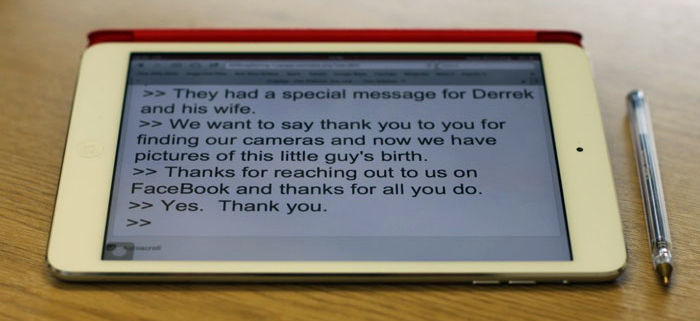Remote captioning services from 121 Captions
If you’re in need of remote captioning services then you’ve found 121 Captions.
We are the UK’s leading experts in captioning, with a reputation that simply can’t be beat.
The speed and accuracy of our highly skilled court reporters and captioners, all of whom are registered and accredited by internationally-recognised professional associations, is second to none.
Here are the three main types of remote captioning services we offer.
Remote captioning for businesses
If you are a business owner, the law states you are required to make “reasonable adjustments” to accommodate those with hearing difficulties. One way to do this is through live captioning.
Live captioning provides equal access for employees, and thus complies with the Equality Act 2010, but it’s not just for deaf and hard of hearing employees.
Live captioning can help keep all staff members informed and involved with what’s going on, especially during Zoom meetings where people can have technical issues. And of course, transcripts are available to read back at a later date, keeping everyone on the same page about what was agreed.
Remote captioning for education
Remote captioning services can really change lives in an educational setting.
Live captioning for education has long been called for by a persistent few, but their voices are starting to resonate in the halls of universities.
The Equality Act not only applies to businesses and employers, but also places of learning, including schools, technical colleges, and universities, making it illegal to discriminate against deaf and hard of hearing students.
Of course, it’s not just a matter of law, it is every student’s right to be able to understand and participate in real time what is being taught in their class.
Working regularly with Disabled Students Allowances (DSAs) assessors, we use high-speed streaming to allow deaf students to participate effectively on their course.
By writing live captions at a rate of 300 words per minute, deaf and hard of hearing students can have an equal learning experience with their peers, asking important questions, and keeping up with the rest of the class.
This service is also carried out discreetly for those who do not wish to draw attention to their struggle to hear.
Offline captioning
Offline captioning is used for videos or programmes which are not broadcast live.
Most people are familiar with this type of captioning as used in subtitles for movies or YouTube videos.
There are two main types of offline captions; closed and open.
Closed captions can be turned on and off by the viewer as needed and are usually found in television programmes and movies. They are also searchable by Google, and as such can help with a website’s SEO.
Open captions are permanently visible on the screen and can not be turned off.
Contact us for all your remote captioning services
When it comes to remote captioning services, we are the leading experts in the country with years of experience captioning events, lectures, and conferences, all over the world and in many different languages.
When it comes to experience, our founder Tina Lannin has been profoundly deaf from birth, so knows a thing or two about the deaf community.
Before setting up 121 Captions, Tina worked as a finance director, expert witness forensic lip reader, C&G ATLA lip reading teacher, deaf awareness trainer, and CEIGHE higher education careers consultant.
Her reputation and that of 121 Captions is beyond reproach, so why settle for less?
Contact us today if you have any questions about how we can help you and your business with our remote captioning services.




Leave a Reply
Want to join the discussion?Feel free to contribute!